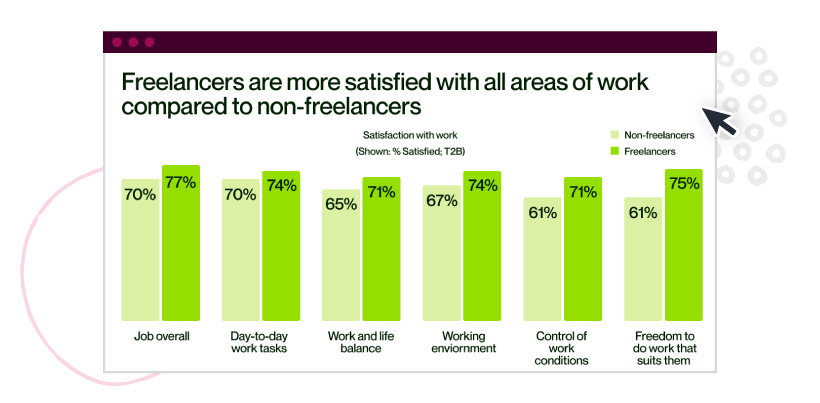Are you a freelancer relying on gig work for your primary or additional source of income?
The number of freelancers has risen steadily in recent years, and the growing use of artificial intelligence (AI) in content marketing, graphic design, programming, and more has caused concern. Because of this, many are asking if the gig economy is the future of work and whether it’s sustainable.
So, what does the future of the gig economy look like?
In this article, we’ll discuss the gig economy and its downsides. Additionally, we’ll look at what to expect in 2025 and beyond and how to prepare for your financial future.
What Is the Gig Economy?
The gig economy is a modern twist on the age-old practice of hiring laborers and artisans for short-term work. Its roots date back centuries, but the term is pretty recent.
“Gig economy” refers to a job market in which task-based workers use digital platforms to find temporary or part-time gigs.
Employers hire gig economy workers on an as-needed basis. As independent contractors, these workers don’t receive the same benefits as traditional employees. Gigs or tasks they can perform run the gamut. Examples are driving for Uber or Lyft, providing short-term home rentals through Airbnb, or completing freelance projects such as writing or graphic design.
Many workers are turning to the gig economy primarily because of flexibility. They can choose their work hours, the types of work to perform, and even the clients to work with. Employers, on the other hand, can tap a large network of talent and service providers without having to employ them full-time.
What Are the Downsides of the Gig Economy?
According to a recent survey, gig workers are happier with their jobs overall compared to non-freelancers (77 percent vs. 70 percent), freer to do the freelance work they like (75 percent vs. 61 percent), and report better work-life balance (74 percent vs. 67 percent).
Image source: A.Team
That said, the gig economy has some notable drawbacks:
- Limited job security: Because gig workers are hired on an as-needed basis, they can be let go at any time.
- Non-guaranteed pay: Income isn’t guaranteed, which can lead to workers accepting low-paying jobs or those that aren’t a good fit. In some very unfortunate cases, they get cheated out of their earnings.
- Limited benefits: Gig workers are independent contractors. Therefore, they are not entitled to traditional employee benefits such as health plans, retirement packages, and paid time off.
- Lack of legal protections: Gig workers are often not subject to wage minimums and overtime pay or protected against harassment and discrimination.
- Dependence on ratings and reviews: Platform ratings and reviews can impact the amount of work gig workers get.
- Little to no collective bargaining power: Often, gig workers and freelancers are lone wolves working by themselves. They don’t have the backing and bargaining power of a workers’ union or other related organization.
- Uncertainty: Because long-term, high-paying work isn’t guaranteed, planning for the future can be challenging.
- Artificial intelligence: While AI has caused many freelancers to worry, it also presents opportunities for growth and specialization. Savvy freelancers can leverage AI tools to enhance their productivity, take on more complex projects, and offer unique human-AI hybrid services.
The Gig Economy and the Future of Work
In 2022, McKinsey’s American Opportunity Survey (AOS) found that 36 percent of employed Americans were independent workers. In 2016, that figure was 27 percent. By 2025, Global Workplace Analytics predicts that approximately 70 percent of the workforce will work remotely at least five days a week. Meanwhile, Tata Consultancy estimates that by the same year, some 40 percent of the global workforce will work from home.
These figures only reinforce the fact that the freelance economy is here to stay.
What lies ahead for freelancers
2025 holds several noteworthy changes and trends for freelancers. These include:
AI support for increased efficiency
Artificial intelligence advances fast. This means freelancers can anticipate more support with workload management and routine task automation.
AI tools can assist with tasks such as:
- Data entry
- Social media management
- Basic administrative tasks
- Project management
- Content creation
Freelancers can then focus on complex tasks that demand human experience and expertise. These can include client interactions, strategic planning, and creative work.
The growing ubiquity of blended teams
With blended teams becoming more commonplace in the workplace, freelancers may find themselves working alongside full-time employees more often.
Organizations are increasingly recognizing the value that on-demand talents bring to the table — specifically, specialized skills and flexibility in an uncertain economy. As such, they are more likely to integrate freelancers into their workforce as needed. This can create more diverse, collaborative work environments.
Products specifically tailored to freelancers
The freelance ecosystem is evolving. With this transformation comes the proliferation of products and services tailored specifically to the unique needs of freelancers. These can include specialized financial tools, project management platforms, insurance options, and various other resources.
Examples are:
- Co-living spaces cropping up in tech hubs and digital nomad hotspots
- Business insurance for freelancers
- Digital-only banks with more affordable cross-border transaction fees
- Niche job platforms that match highly specialized talents with organizations that need them
More regulations protecting freelancers
With more and more independent workers joining the gig economy, governments and regulatory bodies increasingly recognize the need to protect freelancer interests. Expect to see more regulations to ensure fair payment, benefits, and labor rights for freelancers. These can provide freelancers with greater stability and work security.
Skill evolution
The rapid pace of technological change will necessitate continuous upskilling. Freelancers who adapt quickly to emerging technologies and develop expertise in areas like AI, machine learning, blockchain, and augmented reality will be in high demand.
Niche specialization
As AI becomes more prevalent, freelancers who develop deep expertise in specific niches will be better positioned to offer unique value that AI cannot replicate. This specialization will help freelancers differentiate themselves, command premium rates, and secure steady work.
How Can Freelancers Prepare for The Future?
The gig economy and the future of freelance work certainly look promising. However, the drawbacks inherent to both gig and freelance work will remain. Freelancers should put measures in place to cushion themselves from these lingering challenges.
- Develop in-demand skills: Build skills in response to organizations’ growing technology adoption. According to the World Economic Forum, between 2023 and 2027, over 75 percent of organizations will adopt technologies such as big data, cloud computing, AI, digital platforms and apps, e-commerce and digital trade, and education and workforce technologies. Acquire knowledge in rapidly growing areas such as healthcare, data science, statistics, information security, and software development.
- Stay on top of industry trends: The world of work constantly evolves. Keep your finger on the pulse by closely following industry blogs and news outlets, attending conferences, and expanding your professional network. Stay current on the latest tools and technologies in your field.
- Strengthen your brand: Create a strong brand that highlights your experience, skills, and what makes you different. This can mean building a solid presence on social media or launching a regularly updated website.
- Continuously learn: Keep your skills sharp by investing in ongoing training and education. Take courses, attend workshops or conferences, and find a coach or mentor.
- Plan for your long-term financial future: Online talent platforms have the potential to add $2.7 trillion to the global gross domestic product (GDP) by 2025. But freelancers and gig workers can struggle financially without the safety nets that come with traditional, full-time work. So, take steps to plan for retirement and other financial goals. Work with a financial planner to build an emergency fund and set up a retirement savings account. Also, consider getting health and other insurance.
- Diversify your income stream: Don’t put all your eggs in one basket. Reduce your financial risk by working with clients in different niches, industries, or geographies. This can insulate you from fluctuations in demand for specific skills.
Forging Ahead Into the Future of Work
Just like in the years gone by, the gig economy will be exciting but chaotic in 2025.
To keep up, it’s vital that freelancers continuously hone their skills, adapt to new trends and technologies, develop strong relationships with clients and peers, and plan for their financial future.
Ready to step into what lies ahead for the gig economy? Spruce up your ClearVoice CV today!









